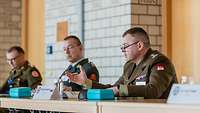Representatives from 18 nations welcomed to Koblenz
Representatives from 18 nations welcomed to Koblenz
- Date:
- Place:
- Germany
- Reading time:
- 2 MIN
The Multinational Medical Coordination Centre/ European Medical Command (MMCCMultinational Medical Coordination Centre/EMCEuropean Medical Command) hosted its multinational steering element from 28 February to 01 March. It was the first meeting of all representatives after the MMCCMultinational Medical Coordination Centre/EMCEuropean Medical Command declared full operational capability almost one year ago.
Since 2018, the representatives of the 18 members meet twice a year to learn about the current state of affairs and innovations. The Steering Committee is the highest decision-making level of the MMCCMultinational Medical Coordination Centre/EMCEuropean Medical Command and is used by the participating nations as the main body for direction and leadership, steering and monitoring, and decision-making on all matters. The interests of all participating nations in all matters affecting the MMCCMultinational Medical Coordination Centre/EMCEuropean Medical Command are considered here. The body approves the program of work (POW) and oversees its implementation; SC decisions are made by consensus of the representatives.
The most important item on the agenda was a discussion of the MMCCMultinational Medical Coordination Centre/EMCEuropean Medical Command's recently developed multinational joint concept of potential support to NATONorth Atlantic Treaty Organization. "We want the MMCCMultinational Medical Coordination Centre/EMS to serve as a liaison element and hub for a network of experts that connects our member nations with key player organizations in military-medical terms" describes the director of the MMCCMultinational Medical Coordination Centre/EMCEuropean Medical Command, Brigadier General Dr. Stefan Kowitz, his idea for the multinational entity of NATONorth Atlantic Treaty Organization and the EUEuropean Union. The concept focuses on the following core tasks for NATONorth Atlantic Treaty Organization.
Mass transport of wounded - but how?
One of the most important tasks is the future development of multinational transnational solutions for mass transport of wounded by land, air or sea. Russia's war against Ukraine demonstrates that the medical services of NATONorth Atlantic Treaty Organization and EUEuropean Union nations must be prepared for large-scale warfare and countless non-combat and combat casualties -it is not only since this moment that NATONorth Atlantic Treaty Organization is interested in a harmonized solution.
Another important point was the confirmation of the "Technical Arrangement". This basic document describes the multinationally defined framework for the daily work in the MMCCMultinational Medical Coordination Centre/EMCEuropean Medical Command. All 18 members nations now have a common employment contract for their personnel working in the Koblenz office. After the vote, the contract will now only be reviewed by lawyers from each nation.
Status of work and projects
During the two-day meeting, in addition to the core tasks, the work program to be completed in the future, the so-called Program of Work (POW) was discussed and confirmed. For this purpose, all department heads of the MMCCMultinational Medical Coordination Centre/EMCEuropean Medical Command presented the current status of their projects. Individual proposals for inclusion in the task portfolio received broad approval.
In addition, NATONorth Atlantic Treaty Organization and EUEuropean Union medical advisors are invited to attend meetings to advise on NATONorth Atlantic Treaty Organization and EUEuropean Union requirements and priorities. The next meeting of the MMCCMultinational Medical Coordination Centre/EMCEuropean Medical Command Steering Committee will be scheduled in autumn.




